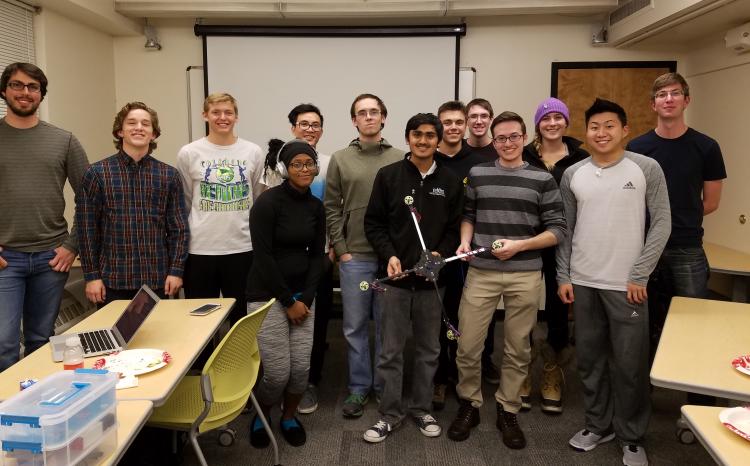Part 2: Student Funding Propels Quadcopter Club
[Editor’s note: This is part two of a four-part series looking at the student-led Engineering Excellence Fund.]

From left, members of the Quadcopter Club include Aaron Pineda, Jock Tuttle, Derek Wright, Gill Gill, Cong Bui, Paul Salame, Soham Shah, Maxwell Moroco, Cole Kenny, Sam Bateman, Rachel Bork, William Tse and Jordan Hammer. Photo by Arielle Blum.
In the spring semester of 2015, the Quadcopter Club received its seed money from the Engineering Excellence Fund and began the club in earnest the following semester. Arielle Blum recruited students from her Projects in Engineering class, COEN 1400.
Club members collaborate to build a quadcopter from scratch. This competition copter is then entered into aerial robotics competitions. Also called “Autonomous Aerial Robotics,” these competitions are based on a quadcopter flying a certain course on its own, interacting with ground objects, and performing a number of tasks or missions. But the goal of competing did not come to fruition easily.
“We were basically in the blind and just Googling things when we first started,” said Thanh Cong Bui, secretary of the club and one of the original members. “Now we are trying to create a process, something more concrete for beginners to grasp.”
Hoping to train new members to continue the work they started, the current Quadcopter Club members are using their recent EEF funding to buy mini drone kits for their club. Because these mini drone kits are simple in design, they allow students with no previous experience to learn the basics of quadcopter engineering on a smaller scale.
“The mini drones are perfect for training new members on necessary vocabulary and how the systems work together so then they can jump into development for the competition quadcopter,” Blum said.
The aforementioned competition quadcopter is the main focus of the club. The club members hope to bring glory to CU through competing.
“It’s a great way to augment the stuff you’re learning in the classroom and apply it in the field,” said club president Soham Shah. “And it raises the public’s awareness of CU Engineering.”
It also provides an outlet for students, an escape from the rigors of an engineering degree.
“Students can get beaten down by a midterm and feel like a failure,” said Blum. “But then they can come to Quadcopter Club and create something that actually works, something tangible. It helps them realize they know more than they think they do.”
This club, like so many others, would not have been possible without the funding established through the EEF, and by extension, the students’ peers. It allows for the students to put to their knowledge to use.
“You learn how to be an engineer by being an engineer,” said Bui.
Tim Drugan-Eppich is an administrative assistant in the College of Engineering and Applied Science.

